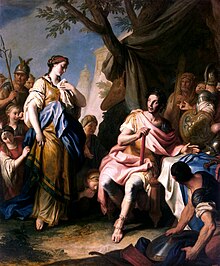Roxana

Roxana (Ancient Greek: Ῥωξάνη; Old Iranian Raoxshna; sometimes Roxanne, Roxanna, Roxandra and Roxane) was a Bactrian princess and a wife of Alexander the Great. She was born earlier than the year 343 BC, though the precise date remains uncertain, and died in c. 310 BC.
Biography
Roxana was born in ca. 340 BC—she was the daughter of a Bactrian nobleman named Oxyartes, who served Bessus, the satrap of Bactria and Sogdia. He was thus probably also involved in the murder of the last Achaemenid king Darius III. After Bessus was captured by the Macedonian ruler Alexander the Great, Oxyartes and his family continued to resist the Greeks, and along with other Iranian notables such as the Sogdian warlord Spitamenes, enforced themselves in a fortress known as the Sogdian Rock.[1]
However, they were eventually defeated by Alexander, who reportedly fell in love with Roxana on sight;[2] in 327 BC, Alexander married Roxana despite the strong opposition from all his companions and generals. Alexander thereafter made an expedition into India, where he appointed Oxyartes as the governor of Punjab and its surroundings. During this period, Roxana was in a safe place in Susa. When Alexander returned to Susa, he promoted a brother of Roxana as one of the troops of the elite cavalry.[1]
After Alexander's sudden death at Babylon in 323 BC, Roxana is believed to have murdered Alexander's other widow, Stateira II, and possibly Stateira's sister, Drypteis,[3] and her cousin, Parysatis II (Alexander's third wife). Roxana had borne a son to Alexander after his death and would have wanted no competition.
Roxana and her son, named Alexander after his deceased father, were protected by Alexander's mother, Olympias, in Macedonia. Olympias' assassination in 316 BC allowed Cassander to seek kingship. Since Alexander IV was the legitimate heir to the Alexandrian empire, Cassander ordered that he and Roxana be killed c. 310 BC.
Historical novels and film
- Roxana is one of the main characters in The Romance of Alexander and Roxana by Marshall Monroe Kirkman, 1909, reprinted 2010, ISBN 978-1-160-01995-8.
- Roxana appears as one of the characters in A Conspiracy of Women by Aubrey Menen, 1965.
- Roxana appears as one of the minor characters in The Persian Boy by Mary Renault, 1972, ISBN 0-394-48191-7. Renault uses the spelling Roxane.
- Roxana appears as one of the characters in Funeral Games by Mary Renault, 1981, ISBN 0-394-52068-8. Renault uses the spelling Roxane.
- Roxana appears as one of the characters in Alexander: The Ends of the Earth by Valerio Massimo Manfredi, 2002, ISBN 978-0-7434-3438-6.
- Roxana is the main character in Roxana Romance by A. J. Cave, 2008, Hardcover ISBN 978-0-9802061-0-4, eBook ISBN 978-0-9802061-1-1.
- In the film Alexander (2004), Roxana is played by Rosario Dawson.
See also
- Balkh
- Alexandre et Roxane, opera by Mozart
References
- ^ a b Badian 2015.
- ^ Horn & Spencer 2012, p. 40.
- ^ Plutarch. Alex. 77.4
Sources
- Badian, Ernst (2015). "ROXANE". Encyclopaedia Iranica.
{{cite encyclopedia}}: Invalid|ref=harv(help) - Renault, Mary (2001). The Nature of Alexander the Great. Penguin. ISBN 0-14-139076-X.
{{cite book}}: Invalid|ref=harv(help) - Plutarch (1919). Perrin, Bernadotte (ed.). Plutarch, Alexander. Perseus Project. Retrieved 6 December 2011.
{{cite book}}: Invalid|ref=harv(help) - Plutarch (1936). Babbitt, Frank Cole (ed.). On the Fortune of Alexander. Vol. IV. Loeb Classical Library. pp. 379–487. Retrieved 26 November 2011.
{{cite book}}: Invalid|ref=harv(help) - Horn, LT Bernd; Spencer, Emily, eds. (2012), No Easy Task: Fighting in Afghanistan, Dundurn Press Ltd, p. 40, ISBN 9781459701649
External links
- Chisholm, Hugh, ed. (1911). . Encyclopædia Britannica (11th ed.). Cambridge University Press.
- Roxane by Jona Lendering
- Wiki Classical Dictionary: Roxane, daughter of Oxyartes
- Roxana from Charles Smith's Dictionary of Greek and Roman Biography and Mythology (1867)
